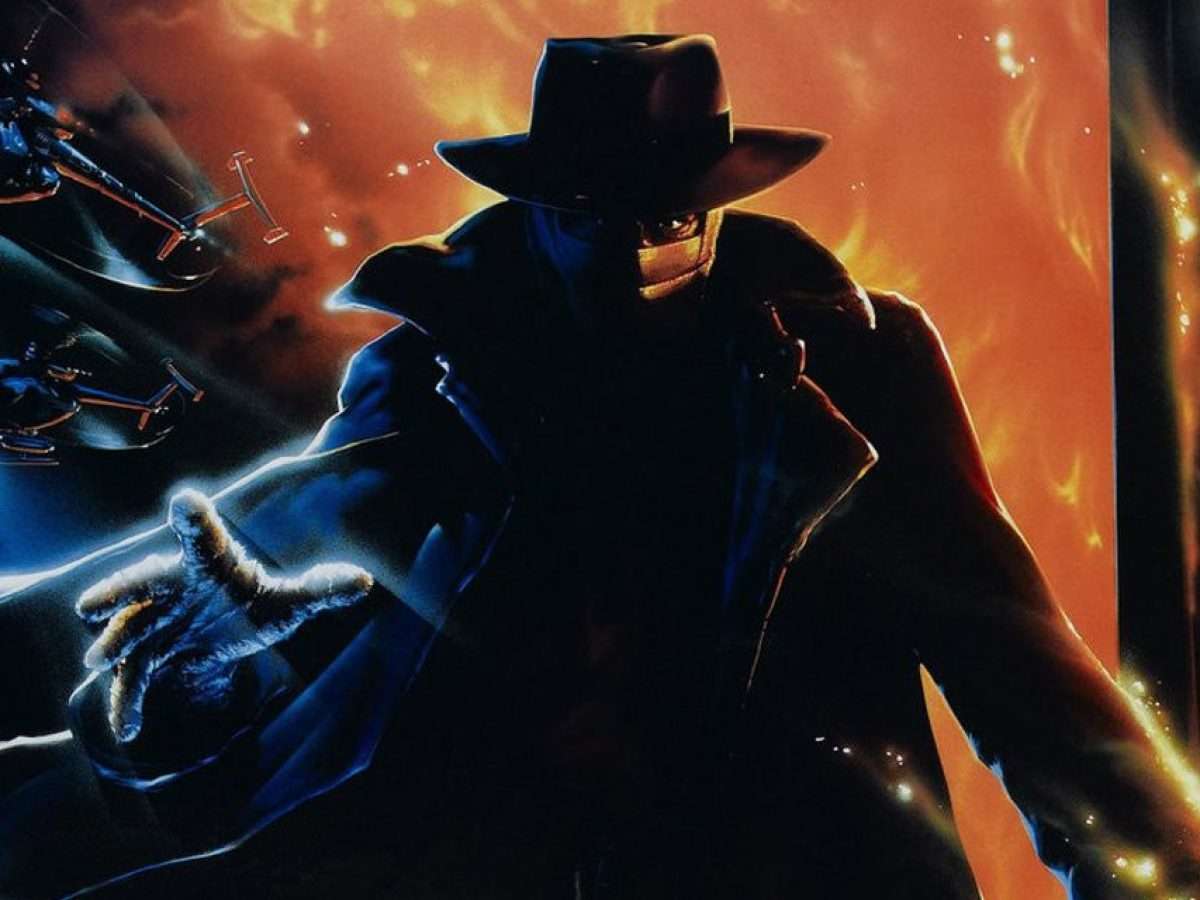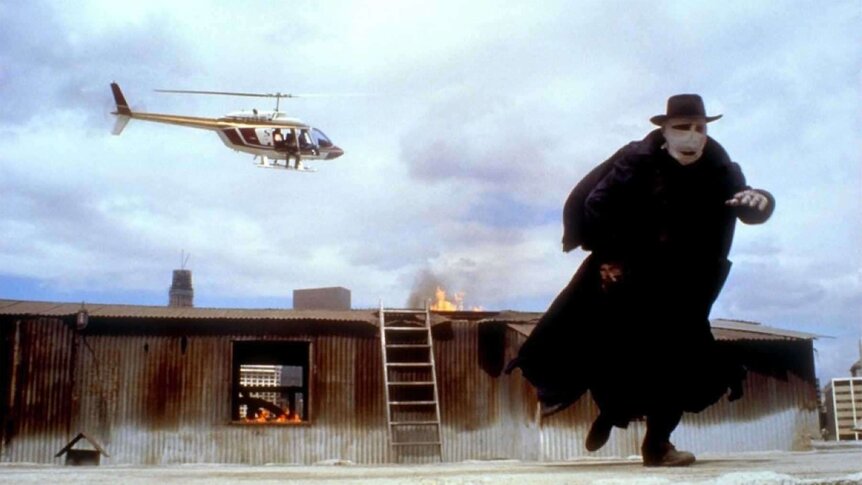Create a free profile to get unlimited access to exclusive videos, sweepstakes, and more!
Why ultra-violent Darkman is Sam Raimi's most underrated masterpiece

In 1990, before comic book movies were a billion-dollar industry that studios churned out like cars on an assembly line, Hollywood took a then-bold gamble on Darkman, the best comic book movie that isn’t based on an actual comic. But, it was inspired by some.
Darkman director Sam Raimi was struggling at the time to get studios to take a risk on him and his dream project — a movie based on The Shadow radio serial. So, he decided to take his love for that property, and DC’s Batman, and create his own superhero. The end result was an R-rated and ultra-violent horror-comic book movie hybrid with zero movie stars and a $16 million budget. The modest summer hit overcame a nightmare post-production process to open No. 1 at the box office on its opening weekend 30 years ago, on its way to becoming one of Raimi’s best films. Surprisingly, it also quickly became one of his most underrated efforts, despite a passionate fanbase that would have you believe it’s a bigger, more mainstream deal that it really is.
As Darkman celebrates its 30th anniversary, we look back at how one of the best films of the '90s slipped through pop culture’s cracks — and why it’s worth revisiting.
Prior to making movie history (and boosting his profile to A-list status) with 2002’s Spider-Man, Raimi garnered attention from Hollywood studios in the late 1980s thanks to his first two Evil Dead films. His success with those cult classics, coupled with the landmark release of Tim Burton’s 1989 Batman, led Universal Studios to court Raimi. The studio wanted its Batman, and, on paper, Raimi seemed poised to give it just that with the tragic (and terrifying) origin story of scientist Peyton Westlake (a pre-fame Liam Neeson): As Peyton pioneers a form of synthetic skin to help burn victims or others suffering from disfigurement, Peyton’s life is literally blown up when he incurs the wrath of a local crime boss (the late Larry Drake) working for a corrupt real-estate magnate.
Soon, Peyton becomes one of the very burn victims he was trying to help — his face and body reduced to a red-raw visage he’s ashamed to acknowledge in the mirror, let alone show to the love of his life, Julie (Frances McDormand). Seemingly immune to pain and prone to rageful bursts of super-strength as a side effect of his trauma, Peyton becomes Darkman. He wraps his face in bandages, dons a black hat and coat, and sets out on a murder-fueled revenge plot to take down those who tried to take him out. Peyton also tries to re-enter his life with Julie while sporting his synthetic skin, but the skin only lasts for a limited time before it decays in a gooey, bubbling fashion.
Like Burton’s Dark Knight, the anti-hero that Raimi created with Darkman lent himself well to a successful marketing campaign, with billboards and posters superimposing the “Who Is Darkman?” slogan over the character as he struck an intimidating pose. (“It would not have opened at No. 1 without ‘Who is Darkman?’,” an exec on the project revealed in a recent oral history from The Hollywood Reporter.)
Unlike Burton’s DC tentpole, however, Darkman attracted much studio interference in the wake of the then-unprecedented success of Burton’s film. Ironically, the very movie that helped get Raimi’s Darkman the greenlight is what put its stakeholders on red alert when test screening scores came back at worrisome levels. The low scores convinced Universal to bring in its own editor, Bud S. Smith, and keep Raimi essentially out of the editing suite.
When Smith’s cut tested worse than Raimi’s, the producers re-edited theirs at the last minute. That’s what went into theaters. “Universal’s attitude at that point was to cut all the weird shit,” composer Danny Elfman told THR. “And I would tell Sam, ‘This crazy stuff is what makes the film.’”
Elfman wasn’t wrong. Raimi’s signature “flying cam” and other visual flourishes hooked in genre fans, but it was Raimi’s sincere, character-driven approach to the macabre material that grounded his more over-the-top touches and made them resonate with audiences. It also didn’t hurt that Peyton is a relatable and likable character that audiences couldn’t help but invest in. He’s on the cusp of both professional and romantic breakthroughs in his life when his future literally goes up in flames. Darkman is forged by hate, with Peyton struggling with bone-deep regret and anger over losing not just the love of his life, but also the ability to love himself.
So, like Batman, Darkman is ultimately a movie about grief. About how loss can be weaponized at the cost of taking away what little is left of the man Peyton thought he was and is now afraid he is becoming. In between all of the explosions, dark comedy, and clever, satisfying fates the bad guys meet, Darkman wisely tethers all of it to Peyton’s emotional storyline. He is in a constant tug of war, desperately clinging to the life he once had to avoid the all-consuming loss that constitutes the one he has now. And he holds on so tightly to the burnt husk of the former, its ashes slipping through his fingers as they ball into the very fists he sicks on the punchable faces of the bad men who turned him into the most tragic of superheroes.
With that said, it’s not surprising Darkman’s first (and only) theatrical release joined other Raimi films filed under “cult status.” Sure, the movie did well enough to spawn two campy direct-to-video sequels — Darkman II: The Return of Durant (1995) and Darkman III: Die Darkman Die (1996) — but after that, the would-be franchise was abandoned. Making it harder to be more of a mainstream film was Darkman’s R-rating (and Raimi’s full embrace of it). His fidelity to the material ultimately proved frustrating to execs hoping to move merch and cash in on the same demographic that shelled out millions on Batman’s marketing blitzkrieg. (In hindsight, however, the studio should have known better. It hired the guy who made two Evil Dead movies to tell a story about a revenge-powered vigilante, clad in rags and scar tissue, dispatching bad guys with increasingly violent glee — what did they expect?)
Raimi’s Darkman is an anamorphic Greek tragedy, full of feverish dutch angles and shaky-cam zooms. And all the crazy shit the studio wanted to cut out of it are what makes it so damn good and endearing.
Darkman joins Raimi’s other underrated masterpieces, like Drag Me to Hell or A Simple Plan, as a film experience that sticks with you long after the end credits roll.



























